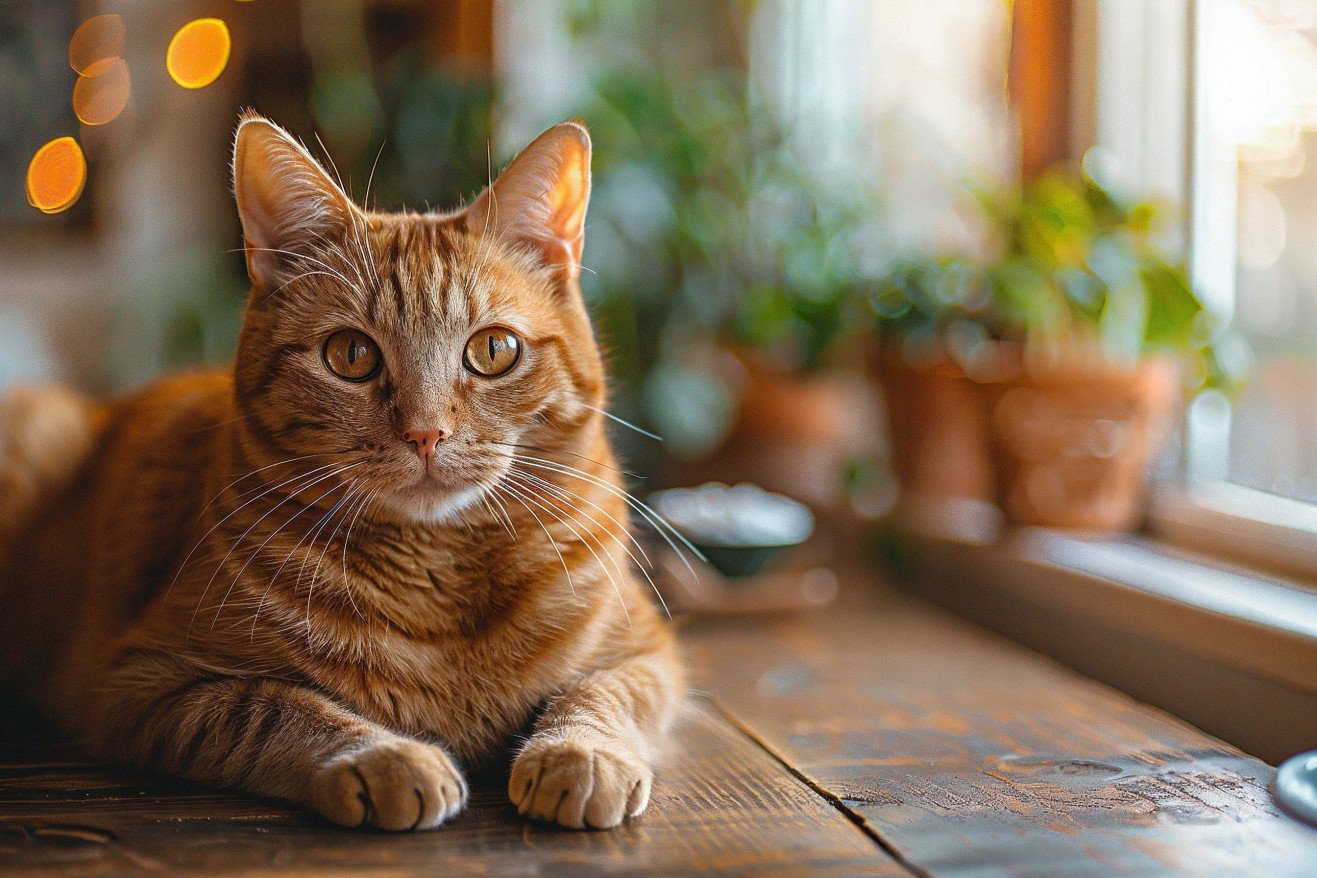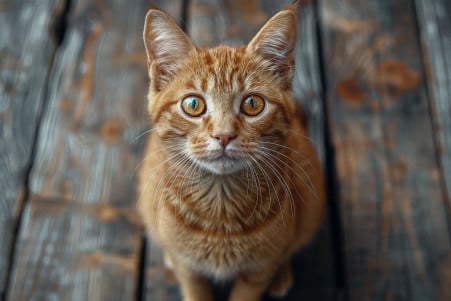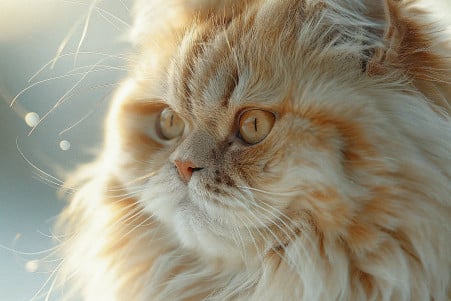Do Orange Cats Have Less Intelligence? The Science Behind the Myth
1 May 2024 • Updated 30 April 2024

Despite the myth that orange cats are less intelligent than other cats, scientific studies have shown that there is no connection between a cat's coat color and its smarts. Coat color is determined by genetics, while a cat's intelligence is influenced by a variety of other factors, including their environment, socialization, and inherited traits that have nothing to do with the color of their fur.
In this article, we'll take a closer look at behavioral studies that have looked at cats' problem-solving skills, as well as neurological studies that have examined the differences in the brains of cats based on their breed and coat color. Through this review of the research, we'll learn more about the true intelligence of orange cats and where the myth that they're less intelligent than other cats came from in the first place.
Do orange cats have less intelligence?
Investigating Feline Intelligence: Behavioral Research and Problem-Solving Skills
Behavioral research has provided insight into feline intelligence and problem-solving skills in cats of different colors. One study even proposed the "feline five" personality traits, which connected neuroticism with anxiety and impulsiveness with erratic behavior. However, it noted that claims of personality differences based on coat color may be influenced by the biases of pet owners.
While one study found differences in human contact-seeking between breeds, another found that there is a lot of variation within breeds, suggesting that personality is a separate construct from breed. Environmental factors, such as early socialization, also play a significant role in shaping personality.
In terms of problem-solving skills, researchers have used puzzles that require cats to figure out how to get to treats or toys to measure their cognitive skills. A 2015 study found that orange cats were more likely to be considered friendly, which contradicts the stereotype of lower intelligence.
However, some studies have been limited. The 1995 study that connected orange cats with rural environments and risk-taking behavior was limited in scope. In addition, surveys of pet owners may be influenced by human biases in how they interpret cat behavior as "smart" or "dumb," as pointed out by one review.
While research into the cognitive differences between cats of different colors is ongoing, the research that has been done so far suggests that coat color is not a reliable predictor of intelligence or problem-solving skills. A more nuanced understanding of the roles of genetics, environment, and individual differences in personality is needed to accurately assess feline cognitive abilities.
Neurological Insights: Investigating Brain Structure and Function in Orange Cats
Neurological studies have attempted to determine if there are differences in brain structure, function, and intelligence based on a cat's coat color. One investigation by Pontier et al. discovered that orange cats have a higher degree of sexual dimorphism, with orange males being larger and orange females being smaller than other cats. This could lead to differences in brain structure and neural pathways that could impact intelligence and problem-solving.
Yet, it is extremely challenging to directly measure feline intelligence through neuroimaging or other neurological means. As CNET points out, "there is little scientific evidence demonstrating [a link between coat color and personality] to be the case in domestic cats." The intricacies of feline intelligence and the limitations of the current research landscape mean that it is hard to say for sure what role, if any, the neurological makeup of orange cats plays in their intelligence.
While future studies may help to better understand the relationship between feline brain structure, genetics, and behavior, current research indicates that coat color is not a reliable way to predict a cat's intelligence. As we continue to investigate the genetics of orange fur, we may learn more about how these factors come together to determine the unique qualities of our feline companions.
The Genetics of Orange Coat Color: Understanding the Science Behind Feline Pigmentation
The genetic basis for orange fur in cats is tied to the X chromosome. As explained by The Genetics of Calico Cats, one of the genes that determines a cat's fur color is on the X chromosome and comes in two versions, one that codes for orange fur (XB) and one that codes for black fur (Xb). In females, who have two X chromosomes, the inactivation of one X chromosome during embryonic development results in a "mosaic" or tortoiseshell pattern of orange and black fur.
Cat Coat Genetics and Science goes on to say that the co-dominant red gene (O/o) is also on the X chromosome and determines whether a cat will have any red/orange coloration in its fur. Females with the dominant homozygous OO genotype will have solid red fur, while females with the heterozygous Oo genotype will have a tortoiseshell pattern. Males, who have only one X chromosome, will either have all orange fur (O) or no red/orange fur (o).
Although these genetic factors determine whether a cat will have orange fur, Cat Genetics 2.0: Colours explains that the Orange gene has not been fully identified. What's more, the Dilution gene can affect the Orange pigmentation, diluting it to a Cream color. Despite these genetic nuances, there is no research to suggest that the genetics of orange fur have any impact on a cat's intelligence or behavior, as outlined in the previous sections.
Personality Traits and Owner Perceptions: Exploring the Stereotypes about Orange Cats
A study conducted by researchers at the Autonomous University of Nuevo León in Mexico found that orange cats scored the highest in terms of trainability, friendliness, and calmness compared to other coat colors, which would seem to confirm the stereotype of orange cats as more loving and social.
Yet, the Psychology Today article warns that this finding may be the result of confirmation bias or a self-fulfilling prophecy, as orange cats are more likely to be male, and male cats have been shown to be slightly friendlier than female cats. The article also suggests that orange cats may show more sexual dimorphism, with males being larger and females being smaller, which could impact their social behavior and reproductive success.
In the end, as the Cat Explore article observes, there is no agreement on the personality traits of orange cats. Instead, a cat's breed, genetics, socialization, and environment all appear to have a significant impact on their individual personality. Furthermore, it warns that relying on owner surveys or anecdotal evidence can be problematic since people's biases and perceptions may color their interpretation of their cats' personalities.
As we learn more about the complexities of feline behavior and intelligence, it's important to remember that accepting each cat as an individual, regardless of their coat color, is the key to understanding their true personality.
The Truth About Orange Cats: Celebrating Their Uniqueness
The studies discussed in this article have shown that the myth that orange cats are less intelligent than cats of other colors is completely false. Multiple studies have shown that there is no scientific evidence that a cat's fur color has any impact on their cognitive abilities or problem-solving skills.
Moreover, behavioral studies have shown that orange cats are more likely to be friendly and sociable, which is the opposite of the stereotype that they are less intelligent. And studies of the feline brain have not found any consistent evidence of a relationship between brain structure, function, and coat color.
In the end, it's important to remember that every cat is an individual with a personality and abilities that go beyond the color of their fur. By celebrating this individuality and avoiding stereotypes, we can come to a better understanding of our orange cats.


